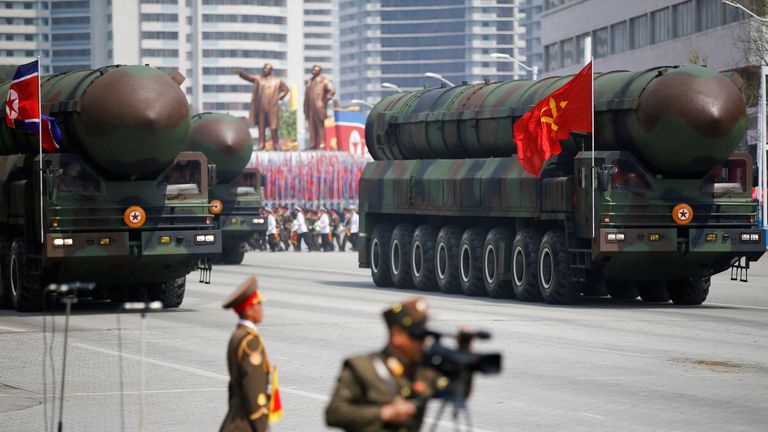North Korea 'moving missile towards west coast' - report
The report comes as South Korea makes its own display of military force and as the US accuses North Korea of "begging for war".
Tuesday 5 September 2017 13:22, UK
North Korea has been seen moving what appears to be an intercontinental ballistic missile towards its west coast, a report says.
North Korea has been seen moving what appears to be an intercontinental ballistic missile towards its west coast, a report says.
South Korea's Asia Business Daily cited an intelligence source as saying that the rocket was spotted moving on Monday, the day after Pyongyang's sixth and largest nuclear test.
The North Korean missile programme's launch facilities are on its west coast - and the move was reportedly made during the night to avoid surveillance.
South Korea's defence ministry said it could not confirm the report, but it said on Monday that its neighbour was ready to launch more missiles.
In July, North Korea tested two ICBMs capable of flying about 6,200 miles, threatening parts of the US mainland.
::
On Tuesday, the South Korean navy held live-fire drills in the Sea of Japan.
These involved the 2,500-ton frigate Gangwon, a 1,000-ton patrol ship and 400-ton guided missile vessels in a show of force that aimed to deter the North.
::
Captain Choi Young-Chan, commander of the 13th Maritime Battle Group, said: "If the enemy launches a provocation above water or underwater, we will immediately hit back to bury them at sea."
South Korea has also been in discussions with the US about deploying aircraft carriers and bombers to the Korean Peninsula.
It was agreed on Monday that the country could scrap a warhead weight limit on its missiles, meaning it could hit back at Pyongyang with greater force.
::
North Korea alarmed the region with its of what it claimed was a hydrogen bomb that could be mounted on to a long-range missile.
The US responded by saying that .
America's ambassador to the UN, Nikki Haley, said her country did not want a conflict with the Pyongyang regime but its patience was "not unlimited".
Speaking at the UN Security Council, Ms Haley said "enough is enough", warning the organisation that its approach of imposing "incremental" sanctions against North Korea had not worked.
Sunday's device is thought to have been about five times larger than the bomb dropped on the Japanese city of Nagasaki in World War II, and it caused a tremor with a magnitude of 6.3.




